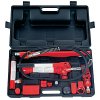I can neither confirm or deny that I am Batman.
A couple of thoughts regarding removing dents:
The guys in WW I had a lot of spare time on their hands, so they weren't in a hurry, worked slowly, and gradually got what they wanted with a lot of hammering.
You can anneal brass with a torch, to make it softer. When it got dented, it was also work hardened a bit, so the dents will come out easier.
There was a discussion a month or so back about annealing brass, heating it with a torch and then cooling it in water.
http://www.bocn.co.uk/vbforum/annealing-cartridge-brass-t40239.html?t=40239&highlight=anneal
If I were actively working on this myself, I would get some round mandrels to go inside the case, under the dent. The mandrel would be as close to the desireable inside diameter as possible, but doesn't need to be a full circle, as you would be pushing it with your porta-power. I would have a curved mandrel on both ends of the hydraulic press to distribute the force, so you don't make a dent towards the outside. If I were you, I would also get an auto body hammer, and as you push the dent out, you gently tap on the brass around the dent.
When you start looking around your area for porta powers, befriend a body shop worker, and have him show you how to hammer out dents.
The best dent removers, are the guys who take dents out of musical wind instruments, like trumpets, etc. When they are done, you can't tell there was ever a dent. You could find the local expert guy that does that and ask him also.
John



